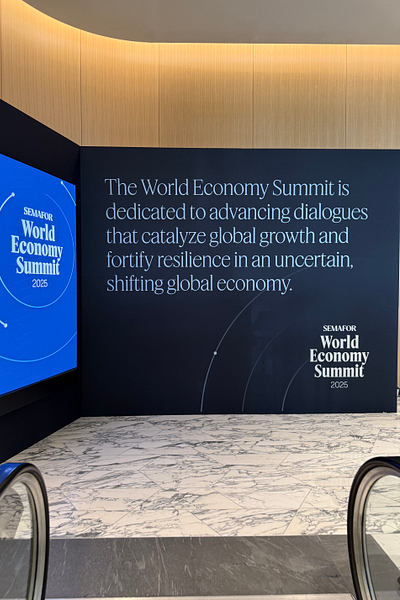World Economy Summit 2025 (Semafor, Washington DC): Part 1
AI can enhance operational efficiency in complex domains. The middle class is a primary focus of the current administration's policies. Consumer concerns are shifting towards value and pricing.
We attended the World Economy Summit organized by Semafor in April 2025, and it was amazing to listen to the heads of a number of Fortune 500 companies.
This conversation explores various themes including the support for retail sellers, the future of fusion energy, reshoring manufacturing in the US, navigating uncertainties in the airline industry, the role of AI in decision-making, Dubai's rapid growth, supply chain resilience, and investments in US manufacturing and infrastructure. The conversation delves into various pressing topics, including consumer concerns in mobile services, the impact of energy assets on interest rates, the future of renewable energy, Mississippi's initiatives in AI and workforce development, global trade dynamics, and the future of nuclear energy and manufacturing in the U.S. Each theme is explored in depth, highlighting the interconnectedness of these issues and their implications for the economy and society.
It also explores the current trade agenda of the U.S. president, focusing on the need for equitable trade relations and the reshoring of manufacturing jobs. It discusses the significant role of energy in manufacturing and the exciting developments in fusion energy. The dialogue also addresses the economic uncertainties faced by various sectors, the importance of AI in operations, and the resilience of supply chains in adapting to new challenges. Finally, it highlights the growing demand for manufacturing in the U.S. and the necessary infrastructure investments to support this shift. The conversation delves into the evolving landscape of consumer concerns, particularly regarding monthly expenses and the need for value-driven products. It explores the future of energy, emphasizing the importance of nuclear energy and the potential for a renaissance in this sector. The discussion also highlights the critical role of manufacturing in the economy, advocating for a return of jobs and economic opportunities to the United States, while addressing the challenges posed by global competition and energy policies.
Takeaways
The U.S. aims for equitable trade relations globally.
Reshoring manufacturing is crucial for blue-collar job growth.
Energy consumption in manufacturing is significantly high.
Fusion energy advancements are promising for the future.
Economic uncertainties require proactive strategies.
AI can enhance operational efficiency in complex domains.
Supply chain resilience is essential in today's market.
Manufacturing demand is shifting back to the U.S.
Infrastructure investment is key to supporting manufacturing growth.
The middle class is a primary focus of the current administration's policies. Consumer concerns are shifting towards value and pricing.
Over 70% of surveyed customers are focused on monthly expenses.
The importance of adapting products to meet customer needs is crucial.
Interest rates are influenced by national debt and asset management.
Energy policy must support manufacturing and economic growth.
Nuclear energy is poised for a renaissance in the U.S.
The U.S. needs to reshore manufacturing to create jobs.
Mississippi is leading in workforce development for new industries.
Renewable energy policies must balance environmental concerns and economic viability.
Manufacturing consumes a significant portion of global energy resources.
Etsy aims to support and protect its sellers.
Fusion energy is on the brink of significant advancements.
The US government is focused on reshoring manufacturing jobs.
Airlines must navigate various uncertainties to remain successful.
AI can enhance decision-making in complex operations.
Dubai has experienced rapid growth and increased global appeal.
Supply chain resilience is crucial in today's economy.
Investments in US infrastructure are essential for manufacturing growth.
Consumer behavior is influenced by economic uncertainties.
The future of energy is shifting towards sustainable solutions. Over 75% of surveyed individuals prioritize price in mobile services.
Energy asset management can significantly influence interest rates.
There is a growing concern about the sustainability of renewable energy sources.
Mississippi is leading in AI workforce development initiatives.
Global trade is shifting towards diversification rather than deglobalization.
Safety standards in AI must exceed human capabilities.
The transportation industry is poised for significant growth.
Nuclear energy capacity in the U.S. has stagnated for decades.
There is a strong push to reshore manufacturing jobs to the U.S.
The U.S. has a competitive advantage in energy resources.
Chapters
00:00 Supporting Etsy Sellers and Economic Resilience
03:01 Fusion Energy: The Future of Power
05:47 Reshoring Manufacturing and Economic Opportunities
08:54 Navigating Uncertainty in the Airline Industry
11:55 AI in Complex Decision-Making
14:55 Dubai's Rapid Growth and Global Appeal
17:59 Supply Chain Resilience and Consumer Behavior
21:12 Investing in US Manufacturing and Infrastructure
22:00 Understanding Consumer Concerns in Mobile Services
23:03 The Impact of Energy Assets on Interest Rates
26:10 Navigating the Future of Renewable Energy
27:49 Mississippi's AI Initiatives and Workforce Development
29:59 Global Trade Dynamics and Small Business Resilience
33:59 The Future of Nuclear Energy and Manufacturing in the U.S.
Sessions
Transcript
Snowpal Products
Backends as Services on AWS Marketplace
Mobile Apps on App Store and Play Store
Web App
Education Platform for Learners and Course Creators



